View in other NatureServe Network Field Guides
NatureServe
Montana
Utah
Wyoming
Idaho
Wisconsin
British Columbia
South Carolina
Yukon
California
New York
Selway Coil-beaked Lousewort - Pedicularis contorta var. rubicunda
State Rank Reason (see State Rank above)
Restricted in Montana to the Bitterroot Mountains where it is documented from several occurrences. Limited data are available for the species and it may be more common than the few collections indicate.
- Details on Status Ranking and Review
Population Size
Score2 - Small: Generally 2,000-10,000 individuals.
CommentEstimated. Available observation and collection information provides little data on population levels.
Range Extent
Score2 - Regional or State Endemic or Small Montana Range: Generally restricted to an area <100,000 sq. miles (equivalent to 2/3 the size of Montana or less) or Montana contributes 50% or more of the species’ range or populations OR limited to 2-3 Sub-basins in Montana.
Area of Occupancy
Score2 - Low: Generally occurring in 4-10 Subwatersheds (6th Code HUC’s).
Environmental Specificity
Score1 - Moderate: Species is restricted to a specific habitat that is more widely distributed or to several restricted habitats and is typically dependent upon relatively unaltered, good-quality habitat (C Values of 5-7).
Trends
ScoreNA - Rank factor not assessed.
CommentTrends unknown, though populations are likely stable or experiencing only minor declines.
Threats
Score0-1 - Low to Medium.
Intrinsic Vulnerability
Score1 - Moderate Vulnerability: Specific biological attributes, unusual life history characteristics or limited reproductive potential makes the species susceptible to extirpation from stochastic events or other adverse impacts to its habitat and slow to recover.
Raw Conservation Status Score
Score
8 to 9 total points scored out of a possible 16 (Rarity factors and threats only).
General Description
Selway lousewort is a glabrous perennial herb with clustered stems, 14-65 cm (6-26 in) high, from a branched rootcrown. Basal leaves, 5-20 cm (2-8 in) long, have a long petiole and a lance-shaped blade, pinnately divided to the midvein into narrow, toothed segments. The few stem leaves become smaller up the stem. Pink flowers, ca. 1 cm long, each subtended by a palmately divided, leaf-like bract, are borne in a narrow, open spike. The short tubular calyx is reddish at the base and has 5 unequal, pointed lobes. The upper petal is marked with purple and has a long, downcurved snout, extending on top of the elliptical lower lip which has 3 shallow lobes. Seeds are borne in a flattened capsule.
Diagnostic Characteristics
Variety contorta has white flowers; Variety ctenophora has pink flowers, but it has a green calyx and bracts covered with long hairs.
Species Range
Montana Range
Range Descriptions
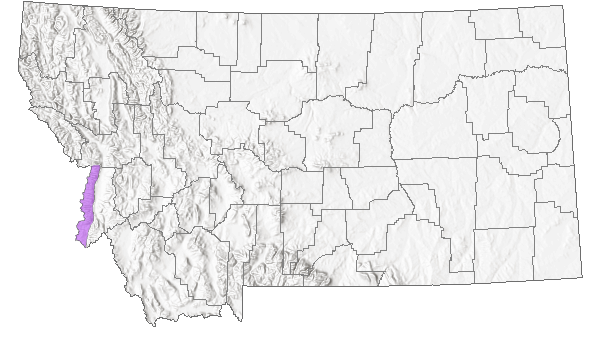
 Native
Native
Range Comments
Variety rubicunda is a regional endemic of the Bitterroot Mountains in Ravalli County, Montana and central Idaho.
Observations in Montana Natural Heritage Program Database
Number of Observations: 18
(Click on the following maps and charts to see full sized version)
Map Help and Descriptions
Relative Density
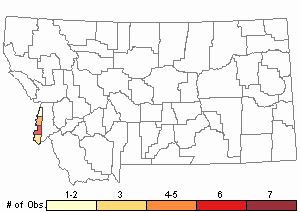
Recency
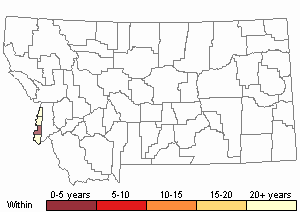

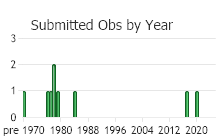
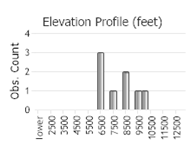 (Observations spanning multiple months or years are excluded from time charts)
(Observations spanning multiple months or years are excluded from time charts)
Habitat
Ridgetops and meadows in the upper subalpine and alpine zones.
National Vegetation Classification System Groups Associated with this Species
Alpine
Alpine - Sparse and Barren
Alpine - Vegetated
Forest and Woodland
Montane - Subalpine Forest and Woodland
Grassland
Montane - Subalpine Grassland
Wetland and Riparian
Alpine Riparian and Wetland
Ecology
POLLINATORS The following animal species have been reported as pollinators of this plant species or its genus where their geographic ranges overlap:
Bombus vagans,
Bombus appositus,
Bombus bifarius,
Bombus fervidus,
Bombus flavifrons,
Bombus frigidus,
Bombus melanopygus,
Bombus mixtus,
Bombus rufocinctus,
Bombus sylvicola,
Bombus occidentalis, and
Bombus kirbiellus (Plath 1934, Macior 1974, Wilson et al. 2010, Miller-Struttmann and Galen 2014, Williams et al. 2014).
Stewardship Responsibility
Threats or Limiting Factors
STATE THREAT SCORE REASON
Threat impact not assigned because threats are not known (MTNHP Threat Assessment 2021).
References
- Literature Cited AboveLegend:
 View Online Publication
View Online Publication Macior, L.M. 1974. Pollination ecology of the Front Range of the Colorado Rocky Mountains. Melanderia 15: 1-59.
Macior, L.M. 1974. Pollination ecology of the Front Range of the Colorado Rocky Mountains. Melanderia 15: 1-59. Miller-Struttmann, N.E. and C. Galen. 2014. High-altitude multi-taskers: bumble bee food plant use broadens along an altitudinal productivity gradient. Oecologia 176:1033-1045.
Miller-Struttmann, N.E. and C. Galen. 2014. High-altitude multi-taskers: bumble bee food plant use broadens along an altitudinal productivity gradient. Oecologia 176:1033-1045. MTNHP Threat Assessment. 2021. State Threat Score Assignment and Assessment of Reported Threats from 2006 to 2021 for State-listed Vascular Plants. Botany Program, Montana Natural Heritage Program, Helena, Montana.
MTNHP Threat Assessment. 2021. State Threat Score Assignment and Assessment of Reported Threats from 2006 to 2021 for State-listed Vascular Plants. Botany Program, Montana Natural Heritage Program, Helena, Montana. Plath, O.E. 1934. Bumblebees and their ways. New York, NY: Macmillan Company. 201 p.
Plath, O.E. 1934. Bumblebees and their ways. New York, NY: Macmillan Company. 201 p. Williams, P., R. Thorp, L. Richardson, and S. Colla. 2014. Bumble Bees of North America. Princeton, NJ: Princeton University Press. 208 p.
Williams, P., R. Thorp, L. Richardson, and S. Colla. 2014. Bumble Bees of North America. Princeton, NJ: Princeton University Press. 208 p. Wilson, J.S., L.E. Wilson, L.D. Loftis, and T. Griswold. 2010. The montane bee fauna of north central Washington, USA, with floral associations. Western North American Naturalist 70(2): 198-207.
Wilson, J.S., L.E. Wilson, L.D. Loftis, and T. Griswold. 2010. The montane bee fauna of north central Washington, USA, with floral associations. Western North American Naturalist 70(2): 198-207.
- Additional ReferencesLegend:
 View Online Publication
View Online Publication
Do you know of a citation we're missing? Lackschewitz, K. 1991. Vascular plants of west-central Montana--identification guidebook. U.S. Forest Service Intermountain Research Station, Ogden, UT. 648 pp.
Lackschewitz, K. 1991. Vascular plants of west-central Montana--identification guidebook. U.S. Forest Service Intermountain Research Station, Ogden, UT. 648 pp. Lesica, P., M.T. Lavin, and P.F. Stickney. 2012. Manual of Montana Vascular Plants. Fort Worth, TX: BRIT Press. viii + 771 p.
Lesica, P., M.T. Lavin, and P.F. Stickney. 2012. Manual of Montana Vascular Plants. Fort Worth, TX: BRIT Press. viii + 771 p. Lesica, P., M.T. Lavin, and P.F. Stickney. 2022. Manual of Montana Vascular Plants, Second Edition. Fort Worth, TX: BRIT Press. viii + 779 p.
Lesica, P., M.T. Lavin, and P.F. Stickney. 2022. Manual of Montana Vascular Plants, Second Edition. Fort Worth, TX: BRIT Press. viii + 779 p. Reese, R.N. 1984. A new variety of Pedicularis contorta (Scrophulariaceae) endemic to Idaho and Montana. Brittonia 36:63-66.
Reese, R.N. 1984. A new variety of Pedicularis contorta (Scrophulariaceae) endemic to Idaho and Montana. Brittonia 36:63-66.
- Web Search Engines for Articles on "Selway Coil-beaked Lousewort"





